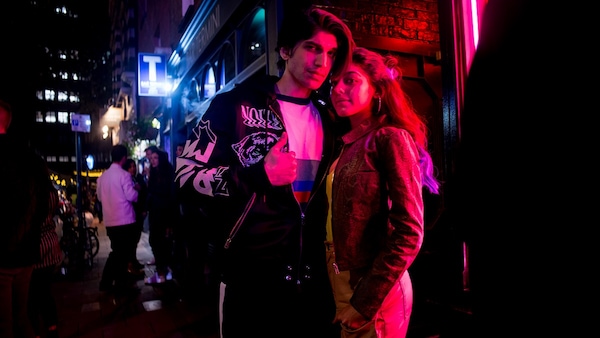Anurag Kashyap's Almost Pyaar With DJ Mohabbat Is An Op-Ed In Film's Garb
This is #CriticalMargin, where Ishita Sengupta gets contemplative over new Hindi films and shows. Here: Anurag Kashyap's Almost Pyaar With DJ Mohabbat.

Karan Mehra, Alaya F in Almost Pyaar With DJ Mohabbat
Last Updated: 04.24 PM, Feb 04, 2023
Like most filmmakers who bear the cross of being auteurs, Anurag Kashyap invites attention. His films insist on discussions, his choices command introspection. This is not to say that they are always deserving, but that they claim it. Kashyap is always interesting even when he is not. But no matter how hard one tries, it is impossible to feel anything for his latest work — Almost Pyaar with DJ Mohabbat. It is so incoherent in design, so frustratingly obtuse in execution that I would have argued the joke is on us. Except, there is not even a punchline.
The hint, I’d argue, was already in the title. Worded as an offspring of Luv Ranjan and Imtiaz Ali, in hindsight, Almost Pyaar with DJ Mohabbat gave a preview of what the film could be: a mishmash of sensibilities. But then again it was Kashyap helming the project. The film, however, is such a muddled approximation of a GenZ phenomenon that it is bad by all three filmmakers’ collective standards.
There are several problems plaguing the outing but chief among them is the absence of a plot. I understand the irony of saying this given the film encompasses two separate stories, spread across geographical borders, unfolding probably at the same time. But having a plot is not the same as including two people who run into each other at regular intervals. There has to be some clarity, some thematic congruence. Some ideas and a semblance of a voice. Almost Pyaar with DJ Mohabbat has none. And yet, there is so much happening.
The film opens in Dalhousie. There is a schoolgirl called Amrita and a boy called Yakub, son of a local vendor. They are sort of friends. She makes TikTok videos (dubbed as Ting Tong in the film) and he shoots them for her. Her family has not given her a phone. In another part of the globe, London to be precise, there is Aisha, a privileged daughter of a Muslim billionaire, and a Sikh musician called Harmeet. That the same set of actors — an impressive Alaya F and debutant Karan Mehta all too aware of his similarity with Ranveer Singh — essay both characters hints at a larger narrative ruse. They might be star-crossed lovers, separated by time and space but united in their common fate? Or, they might be doppelgangers destined to mirror their stories? Kashyap never reveals. Instead, he stacks both these narratives against a mountain of odds that encompass everything from patriarchy, love-jihad, class barriers and unwilling parents. There is also a prison sub-plot thrown in that seems like it belongs to a different film.
This is a pity because the central preoccupation of Almost Pyaar with DJ Mohabbat, in the wise words of Hussain Dalal, is that love is all we need. But instead of designing his film as a compelling love story that would reiterate the intent, Kashyap invests most in crafting the odds. And uses a certain DJ Mohabbat (Vicky Kaushal in his most annoying turn), a part-time podcaster who talks like a full-time, second-hand Rumi, to lend a voice to this restless young generation. There is so much on show that there’s nothing to tell.
Amrita is a Hindu. Her family gets irked when she talks to Yakub, a Muslim boy. But things go out of hand when they leave home together, a sort of friendly eloping, to meet DJ Mohabbat. Her family perceives it as love jihad. The characters are too young to realise this could be a problem till it is too late. In London, Aisha is obsessed with the diffident Harmeet. She keeps pursuing him. When he finally gives in, their lives get upended.
In both narratives, premises of nascent love are usurped by opposing forces. Kashyap seems to point a finger at the world while upholding the need for love. His gaze, however, is always elsewhere. What the filmmaker really wants to address is the ills prevalent in modern society, the religious bigotry that has come to be embedded in our secular fabric. He clumsily wraps them with the cover of love hoping to make his rage more palatable. But this is dishonest precisely because it reduces the characters to talking heads, relaying what the director wants to say, without any depth. Take for instance that scene where Yakub, out of nowhere and with zero evidence of any insight, says if religion was a store, he would never visit it.
All stories are political even when they are not. But with Almost Pyaar with DJ Mohabbat, Kashyap has tried making a story about his politics. To be fair, there is nothing wrong in that but writing an op-ed would have been more befitting.
